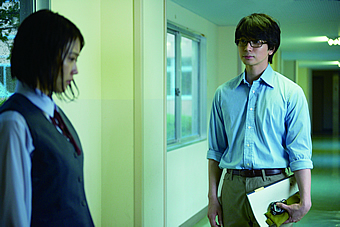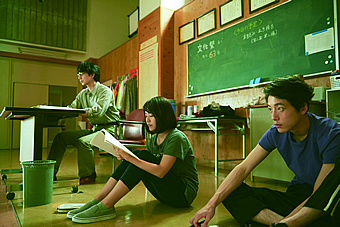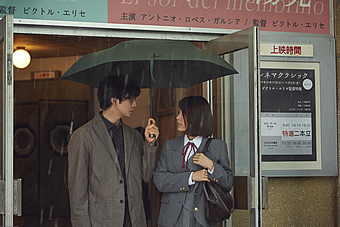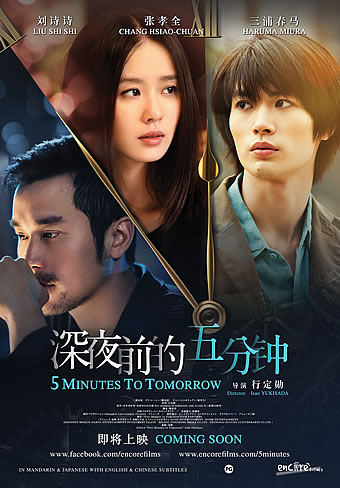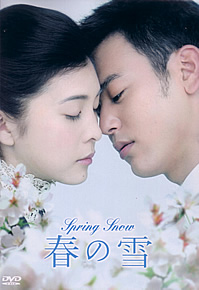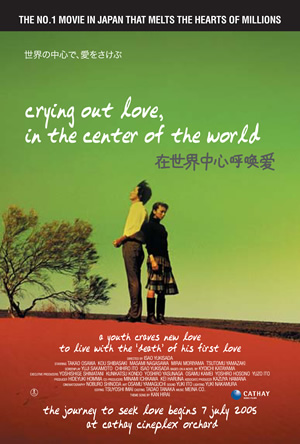NARRATAGE (ナラタージュ) (2017)
Genre: Drama/Romance
Director: Isao Yukisada
Cast: Jun Matsumoto, Kasumi Arimura, Kentaro Sakaguchi, Onishi Ayaka, Furutachi Yutaro, Kamioka Miki, Seto Koji, Komaki Ryusuk, Kaneko Daichi, Ichikawane Mikako
Runtime: 2 hrs 20 mins
Rating: TBA
Released By: Encore Films and Golden Village Pictures
Official Website:
Opening Day: 14 December 2017
Synopsis: In the spring of her second year at university, Izumi (Kasumi Arimura) receives a phone call from the object of her unrequited love—her former high school teacher, Hayama (Jun Matsumoto). He requests for her help in one of her junior’s graduation performance for the drama club. During Izumi’s high school days, Hayama brought her out of her shell, and she eventually fell for him. Thrilled by the unexpected opportunity of seeing him again, Izumi is stirred with memories of Hayama, especially that of her own graduation day, and a secret that he had confessed to her then.
Movie Review:
‘Narratage’ tells of a love story between a high-school teacher and his teenage student, though that’s not nearly the most unsettling element about it. As those who are acquainted with the Rio Shimamoto bestseller on which this movie is based may tell you, the later parts of the story can either be genuinely touching or genuinely disturbing, depending on whether you embrace its idea of enduring love. But in order to even get to that two-hour mark of a very languidly-paced 140-minute film, you’ll have to be prepared to settle in real snug, or risk getting impatient, frustrated and even annoyed by the sheer lethargy at which it unfolds.
At the core of the story is the pair of lovers Izumi (Arimura Kasumi) and Hayama (Jun Matsumoto), who begin their dalliance when the latter invites the former to join his drama club after noticing that she cannot quite get along with the rest of her classmates. Izumi starts visiting Hayama at his office during lunch and unsurprisingly develops feelings for him. Notwithstanding, she only musters the courage to tell him how she feels on the day of her graduation, though he responds by asking her to find her own happiness instead. Hayama shares that he is in fact married, but that he is currently separated from his mentally ill wife, who had attempted to burn down their house before moving back to stay with her parents.
Like the novel, Isao Yukisada’s film employs a flashback-within-a-flashback-within-a flashback construction to portray their protracted romance – and by that, we mean there are a total of three distinct time periods over which their love unfolds, bookended by present-day scenes of Izumi poring over an antique pocket watch whose significance will become clear right at the end. Occupying the majority of the screen time are the events one year later after Izumi’s graduation, when the first-year university student receives a call from Hayama to help out at the drama club. Unsurprisingly, Izumi accepts the offer, but seeing Hayama again rekindles her feelings for him. Complicating their relationship is a fellow university student also helping out at the club, Ono (Kentaro Sakaguchi), whose feelings towards her she realises over time that she cannot wholeheartedly reciprocate.
Truth be told, watching Izumi go back and forth between Hayama and Ono is likely to earn the consternation of less than die-hard romantics. Although it’s clear that the film wants us to root for Izumi and Hayama to be together, it is difficult to sympathise entirely with any one of these three characters. On one hand, you have Izumi wavering between letting go of her love for Hayama and committing herself fully to Ono; on another, you have Hayama feeling torn between his commitment towards his wife and his feelings for Izumi; and on yet another, you have Ono getting manipulative with Izumi in order to win the full extent of her affections – one particularly vexing sequence sees Izumi calling Ono for help while walking home late at night after sensing someone stalking her, only to have Ono demand that she love him more in return first, leading her to feel disillusioned and find her way to Hayama’s place instead for solace.
The third and final time period of events happen a couple of weeks after a tragic incident involving one of the drama club students leaves the three of them devastated and thereafter detached from one another. Like we mentioned at the beginning, this is also the most ethically troubling part of the whole sprawling narrative, even we suspect for those who have bought into the love between Izumi and Hayama. On a purely emotional level, it’s understandable why the both of them would like to finally be able to consummate their relationship with each other; but in the context of Hayama deciding to play the dutiful husband who returns to his wife’s side in order to be with her, it almost completely changes how we think about him, and therefore leaving us feeling bitter at being led on to empathise with his predicament in the first place. To be sure, the fault of that last-minute twist doesn’t lie with the film’s helmer Yukisada or his screenwriter Anne Horiizumi, but it certainly affects our opinion of the movie as a whole.
Next to that, there is little to quibble about Kasumi or Matsumoto’s performances, which are sufficiently sincere and transparent. Ditto for the technical specs of the film, which under Yukisada’s supervision come off sleek and polished. Quite honestly, we can’t quite see ‘Narratage’ becoming a classic anytime, not like say Shunji Iwai’s ‘Love Letter’. Unless you confess yourself to be a die-hard romantic, this deliberately-paced, long-drawn affair will likely test your patience and thereafter your temperament. Certainly, the book has its fans who may love or hate the movie from their point of view, but for everyone else, you’ve been duly warned.
Movie Rating:



(Unless you count yourself a die-hard romantic, this story of unrealised affection, unrequited adoration and misplaced intimacy will test your patience and then your temperament)
Review by Gabriel Chong
You might also like:
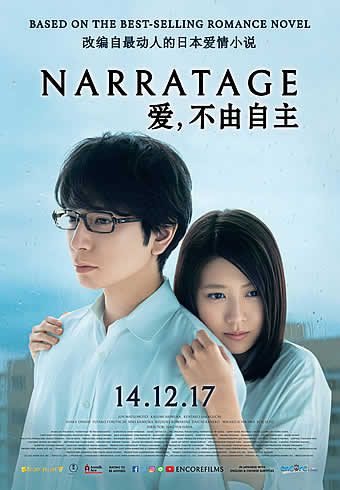
Movie Stills


